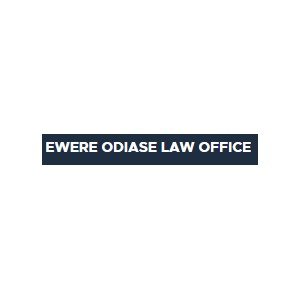Best Divorce & Separation Lawyers in Asaba
Share your needs with us, get contacted by law firms.
Free. Takes 2 min.
Free Guide to Hiring a Family Lawyer
List of the best lawyers in Asaba, Nigeria
Nigeria Divorce & Separation Legal Questions answered by Lawyers
Browse our 29 legal questions about Divorce & Separation in Nigeria and read the lawyer answers, or ask your own questions for free.
- Can a woman seek divorce from her husband if he cheated and got another lady to bear a child for him?
- The marriage happened in 2019. No court wedding, just a church and a traditional wedding. Also, no child throughout the wedding period. Husband got another lady pregnant and bore a child for him while still married. Is this enough grounds to dissolve the marriage, and what's the best approach if... Read more →
-
Lawyer answer by Papireddy Associates
Yes, a woman can seek dissolution of her marriage if her husband cheated and had a child with another woman while still married, as adultery is a recognized ground for divorce under Indian law, including for marriages performed traditionally or...
Read full answer - Is 2 to 3 months enough for a divorce to process
- Can I file for a divorce on grounds of fertility negligence, and my husband says he doesn't want to have children with me? Bullying by his brother? Accusations of his brother's child dying because of my prayers? Saying he was lured into marrying me?
-
Lawyer answer by Guidance Law Firm
You can successfully sustain a divorce suit on the grounds you stated. However, 2 to 3 months is not enough for the divorce suit to be concluded in court. It will take at least six months for the divorce to...
Read full answer - How do I go about filling for a divorce
- It is obvious that the marriage is no longer working and both of us are exhausted trying to make it work. How do we go about it?
-
Lawyer answer by Solomon & Co.
Filing for divorce involves specific procedures depending on your personal law - mutual consent divorces are quicker, while contested cases require detailed grounds, evidence, and court hearings. The process includes filing a petition, possible counseling/mediation, and a final decree by...
Read full answer
About Divorce & Separation Law in Asaba, Nigeria:
In Nigeria, divorce, often known as dissolution of marriage, is regulated by the Matrimonial Causes Act. The basis for divorce in Nigeria is that the marriage has broken down irretrievably. In Asaba, being a part of Nigeria, adheres to the same laws. Nonetheless, certain ethnic norms and traditions may also come into play, depending on the specifics of each case.
Why You May Need a Lawyer:
If you find yourself in a circumstance where your relationship is fractured, legal guidance can be invaluable. Matters of property division, child custody, child support, and spousal maintenance following separation or divorce are complex and fraught. A lawyer can help protect your rights, provide objective advice, and guide you through the judicial process, making it less stressful and more manageable.
Local Laws Overview:
The prominent grounds for divorce in Asaba, and Nigeria as a whole, include adultery, cruelty, desertion for a certain period, and other behaviors signifying that the parties can no longer cohabitate. One important aspect is that under Nigerian law, only the High Court is empowered to grant divorces. In terms of property, the court considers what would be just and fair to both parties rather than an equal sharing.
Frequently Asked Questions:
1. How long does a divorce process take in Asaba?
The duration of divorce processes can vary widely. Yet, typically, an uncontested divorce might take three to six months, while contested divorces can take considerably longer.
2. How is child custody decided in divorce cases?
The general rule under Nigerian law is that the welfare of the child is paramount. Therefore, the court considers factors like age, sex, and the emotional, physical, and educational needs of the child when deciding custody.
3. What happens to conjugal property in a divorce?
The Nigerian law does not automatically divide conjugal property equally between spouses in the event of a divorce. The court decides based on what is considered just and equitable to both parties.
4. Can I remarry right after a divorce?
Yes, once a divorce is finalized, you are free to remarry. However, ensure the decree absolute has been issued, formally ending your previous marriage.
5. How much does it cost to hire a divorce lawyer?
The cost of hiring a lawyer can fluctuate based on experience, complexity of the case, and length of the proceedings, among other factors. It's advisable to discuss fees before hiring a lawyer.
Additional Resources:
You might find the following resources helpful: Nigeria Legal Information Institute and Legal Aid Council of Nigeria. Ensure to use official websites of these resources for accurate and up-to-date information. You can also refer to the Matrimonial Causes Act for more information.
Next Steps:
If you need legal assistance in matters of divorce and separation, your next step should be to seek legal counsel from a reputable law firm or lawyer specialized in divorce and family law. Before the consultation, prepare all relevant information and questions you may have to help the lawyer understand your case better and provide appropriate advice.
Lawzana helps you find the best lawyers and law firms in Asaba through a curated and pre-screened list of qualified legal professionals. Our platform offers rankings and detailed profiles of attorneys and law firms, allowing you to compare based on practice areas, including Divorce & Separation, experience, and client feedback.
Each profile includes a description of the firm's areas of practice, client reviews, team members and partners, year of establishment, spoken languages, office locations, contact information, social media presence, and any published articles or resources. Most firms on our platform speak English and are experienced in both local and international legal matters.
Get a quote from top-rated law firms in Asaba, Nigeria — quickly, securely, and without unnecessary hassle.
Disclaimer:
The information provided on this page is for general informational purposes only and does not constitute legal advice. While we strive to ensure the accuracy and relevance of the content, legal information may change over time, and interpretations of the law can vary. You should always consult with a qualified legal professional for advice specific to your situation.
We disclaim all liability for actions taken or not taken based on the content of this page. If you believe any information is incorrect or outdated, please contact us, and we will review and update it where appropriate.










